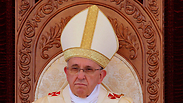
Popes faces serious task
צילום: רויטרס
Pope's Mideast trip a delicate dance around politics
Pope has to walk fine line during Holy Land visit, juggling faith, politics and local issues in bid to promote inter-religious dialogue as vehicle for peace.
With a rabbi and a Muslim leader in tow, Pope Francis makes his first visit to the Middle East on Saturday, a delicate mission to push his vision of inter-religious dialogue as a vehicle for peace in the region.
But, in a region where religion and politics are inextricably intertwined, the three-day trip to Jordan, the Palestinian Territories and Israel will set the leader of the world's 1.2 billion Catholics on a diplomatic tightrope.
All of his actions and words - from his meetings with Palestinian and Syrian refugees, to his encounters with Christians whose numbers are dwindling in the Holy Land, to his talks with national leaders - will be closely watched for their political significance.
Even the pope's official program touches on the raw sensitivities that pervade Middle East politics. It calls the second leg of his trip, a six-hour stop in Bethlehem, a visit to the "State of Palestine", a terminology Israel rejects.
"We are not very happy about it, but it is a fact (that the Vatican is using the term)," said Oded Ben-Hur, a senior diplomatic adviser to the Israeli parliament and former ambassador to the Vatican.
In 2012, the Vatican angered Israel by supporting a vote in the United Nations' general assembly to give Palestinians de-facto statehood recognition. Israel argues such a move should only come through negotiations.
The Vatican backs a two-state solution to the conflict, with secure borders for Israel, but there are divergent views over the future status of Jerusalem.
Disputed city
The Vatican wants international guarantees protecting Jerusalem as a city sacred to Christianity, Islam and Judaism.
Palestinians want East Jerusalem and the Holy City, which Israel captured in the 1967 war, as the capital of their future state, while Israel says the city is its "united and eternal" capital. Most states, including the Vatican, have not recognized this and keep their embassies in Tel Aviv.
In a stark illustration of the complexities of the political situation, instead of making the short overland ride from Bethlehem to Jerusalem, Francis will fly by helicopter to Tel Aviv and then take another helicopter to Jerusalem.
To underscore his conviction that all three great monotheistic faiths can live together in the region and help to budge the political stalemate, Francis has enlisted a rabbi and an Islamic leader to be part of a travelling papal delegation for the first time.
The two - Rabbi Abraham Skorka and Omar Abboud, director of the Institute for Religious Dialogue in Buenos Aires - are friends from when Francis was cardinal in his native Argentina.
Their presence is "an extremely strong and explicit signal" about the importance of inter-religious dialogue in the region, the Vatican spokesman, Father Federico Lombardi, said.
Skorka will be in the Palestinian Territories and a key Islamic site in Jerusalem, while Abboud will be at the Western Wall sacred to Jews and the Yad Vashem memorial to the victims of the Holocaust.
Francis, only the fourth pope to visit the Holy Land, will spend little more than 32 hours in Israel but, with 16 events, the final leg of the tour will be the most packed and has stirred the most controversy and security concerns.
Threats to Christians
Threats to Christians have been scrawled by suspected Jewish radicals on Church property, acts Archbishop Fouad Twal, Jerusalem's top Catholic official, said had "poisoned" the atmosphere.
One read "Death to Arabs and Christians and all those who hate Israel".
Israeli security forces, fearing that radicals might carry out a major action against the Christian population or institutions, issued restraining orders against several Jewish right-wing activists for the duration of the trip..
In Jerusalem, Francis will visit most of the sites associated with the last days in the life of Jesus, including the site where Jesus is said to have been buried, and also meet Jewish and Muslim leaders separately.
Security will also be heightened because the pope has ruled out using bulletproof vehicles and wants to use an ordinary car, as he does in Rome.
"That does not leave us a lot of leeway," Ben-Hur said, adding that so-called "sterile areas", where access by the public will be highly limited, will have to be larger.
The visit is also much shorter than those by Pope John Paul II in 2000 and Pope Benedict in 2009. The brevity has disappointed local Christians because fewer will get to see him.
The trip, which started in Jordan on Saturday, is intended to mark the 50th anniversary of Pope Paul VI's meeting in Jerusalem in 1964 with Patriarch Athenagoras, the spiritual head of the world's Orthodox Christians.
That meeting marked a turning point in relations between the two branches of Christianity that split in 1054 and will be commemorated in the pope's meetings with Bartholomew, the current Orthodox Ecumenical Patriarch.










